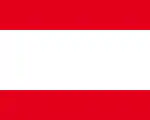Peter II, Grand Duke of Oldenburg
Peter II (German: Nikolaus Friedrich Peter) (8 July 1827 – 13 June 1900) was the reigning Grand Duke of Oldenburg from 1853 to 1900. He claimed hereditary parts of Duchy of Holstein after the Second Schleswig War in 1864. After signing a treaty on 23 February 1867 in Kiel, he renounced his claims. In return, he received the district of Ahrensbök, the Prussian parts of the former Principality of Lübeck other than the village of Travenhorst, and was given a million taler as compensation from Prussia. Thus the Grand Duchy of Oldenburg gained access to the Baltic Sea.
| Peter II | |||||
|---|---|---|---|---|---|
.png.webp) | |||||
| Grand Duke of Oldenburg | |||||
| Reign | 27 February 1853 – 13 June 1900 | ||||
| Predecessor | Augustus | ||||
| Successor | Frederick Augustus II | ||||
| Born | 8 July 1827 Oldenburg | ||||
| Died | 13 June 1900 (aged 72) Rastede | ||||
| Burial | Ducal Mausoleum, Gertrudenfriedhof, Oldenburg | ||||
| Spouse | Elisabeth of Saxe-Altenburg | ||||
| Issue | Frederick Augustus II Duke Georg Ludwig | ||||
| |||||
| House | House of Holstein-Gottorp | ||||
| Father | Augustus | ||||
| Mother | Princess Ida of Anhalt-Bernburg-Schaumburg-Hoym | ||||
| Religion | Lutheranism | ||||
Birth and family
Duke Nikolaus Friedrich Peter was the only son of Augustus, Grand Duke of Oldenburg by his second wife Princess Ida of Anhalt-Bernburg-Schaumburg-Hoym. He was born on 8 July 1827 in Oldenburg.[1]
Early life
In his youth, he served as a General of Cavalry in the Prussian army. He also served as General of Infantry in the Hanoverian Army.[1]
Marriage
On 10 February 1852, Peter married Princess Elisabeth of Saxe-Altenburg.[2] She was the fourth daughter of Joseph, Duke of Saxe-Altenburg and Amelia of Württemberg, and was a sister of Queen Marie of Hanover and Grand Duchess Alexandra Iosifovna of Russia.
They had two sons, Frederick Augustus (born in 1852) and George (born in 1855). Peter II may have had an illegitimate son, Peter Altmann (Rastede 1857-Brighton 1934), married and had issue.
Reign
He succeeded his father as Grand Duke in 1853.[3] Peter ruled over a population of roughly 800,000.[3]
Peter's family had ties to the Russian imperial family (both were descendants of Christian Albrecht of Holstein-Gottorp), so that he sided with Russia against Austria during the Crimean War. During the First Schleswig-Holstein War, he laid claim to part of the territories seized by Prussia, but in 1866 ceded his claim to the duchies.[1] The following year, he created a military compact with Prussia, in which his troops were incorporated into the corps of Prince Frederick Charles of Prussia during the Franco-Prussian War.[1]
In 1896, his wife Elisabeth died.[2] She died a year after their daughter-in-law Elisabeth Anna.
After he suffered from heart trouble resulting from overwork, Peter's physicians recommended he have a long trip abroad.[4] He died the following year, on 13 June 1900 at his summer residence in Rastede.[1] He was succeeded as Grand Duke by his eldest son, Frederick Augustus.
Honours
 Oldenburg: Grand Prior of the House and Merit Order of Duke Peter Friedrich Ludwig[5]
Oldenburg: Grand Prior of the House and Merit Order of Duke Peter Friedrich Ludwig[5].svg.png.webp) Saxe-Weimar-Eisenach: Grand Cross of the White Falcon, 25 May 1847[6]
Saxe-Weimar-Eisenach: Grand Cross of the White Falcon, 25 May 1847[6].svg.png.webp)
.svg.png.webp)
.svg.png.webp) Ernestine duchies: Grand Cross of the Saxe-Ernestine House Order, June 1847[7]
Ernestine duchies: Grand Cross of the Saxe-Ernestine House Order, June 1847[7] Ascanian duchies: Grand Cross of Albert the Bear, 30 November 1847[8]
Ascanian duchies: Grand Cross of Albert the Bear, 30 November 1847[8].svg.png.webp) Kingdom of Prussia:[9]
Kingdom of Prussia:[9]
- Knight of the Black Eagle, 17 May 1850; with Collar, 1868
- Grand Cross of the Red Eagle, 8 August 1866
 Denmark: Knight of the Elephant, 2 April 1853[10]
Denmark: Knight of the Elephant, 2 April 1853[10] Grand Duchy of Hesse: Grand Cross of the Ludwig Order, 3 April 1853[11]
Grand Duchy of Hesse: Grand Cross of the Ludwig Order, 3 April 1853[11].svg.png.webp) Baden:[12]
Baden:[12]
- Knight of the House Order of Fidelity, 1853
- Grand Cross of the Zähringer Lion, 1853
.svg.png.webp) Kingdom of Bavaria: Knight of St. Hubert, 1853[13]
Kingdom of Bavaria: Knight of St. Hubert, 1853[13].svg.png.webp) Belgium: Grand Cordon of the Order of Leopold, 10 April 1853[14]
Belgium: Grand Cordon of the Order of Leopold, 10 April 1853[14] Württemberg: Grand Cross of the Württemberg Crown, 1853[15]
Württemberg: Grand Cross of the Württemberg Crown, 1853[15] Kingdom of Hanover: Knight of St. George, 1855[16]
Kingdom of Hanover: Knight of St. George, 1855[16] Austrian Empire: Grand Cross of St. Stephen, 1858[17]
Austrian Empire: Grand Cross of St. Stephen, 1858[17].svg.png.webp) Kingdom of Saxony: Knight of the Rue Crown, 1876[18]
Kingdom of Saxony: Knight of the Rue Crown, 1876[18]
Ancestry and descent
Ancestry
| Ancestors of Peter II, Grand Duke of Oldenburg | |||||||||||||||||||||||||||||||||||||||||||||||||||||||||||||||||||||||||||||||||||||||||||||||||||||||||||||||||||||||||||||||||||||||||||||||||||||||||||||||||||||||||||||||||||||||||||||||||||||||||||||||||||||||||||||||||||||||||||||||||||||||||||||||||||||||||||||||||||||||||
|---|---|---|---|---|---|---|---|---|---|---|---|---|---|---|---|---|---|---|---|---|---|---|---|---|---|---|---|---|---|---|---|---|---|---|---|---|---|---|---|---|---|---|---|---|---|---|---|---|---|---|---|---|---|---|---|---|---|---|---|---|---|---|---|---|---|---|---|---|---|---|---|---|---|---|---|---|---|---|---|---|---|---|---|---|---|---|---|---|---|---|---|---|---|---|---|---|---|---|---|---|---|---|---|---|---|---|---|---|---|---|---|---|---|---|---|---|---|---|---|---|---|---|---|---|---|---|---|---|---|---|---|---|---|---|---|---|---|---|---|---|---|---|---|---|---|---|---|---|---|---|---|---|---|---|---|---|---|---|---|---|---|---|---|---|---|---|---|---|---|---|---|---|---|---|---|---|---|---|---|---|---|---|---|---|---|---|---|---|---|---|---|---|---|---|---|---|---|---|---|---|---|---|---|---|---|---|---|---|---|---|---|---|---|---|---|---|---|---|---|---|---|---|---|---|---|---|---|---|---|---|---|---|---|---|---|---|---|---|---|---|---|---|---|---|---|---|---|---|---|---|---|---|---|---|---|---|---|---|---|---|---|---|---|---|---|---|---|---|---|---|---|---|---|---|---|---|---|---|---|---|---|
| |||||||||||||||||||||||||||||||||||||||||||||||||||||||||||||||||||||||||||||||||||||||||||||||||||||||||||||||||||||||||||||||||||||||||||||||||||||||||||||||||||||||||||||||||||||||||||||||||||||||||||||||||||||||||||||||||||||||||||||||||||||||||||||||||||||||||||||||||||||||||
Issue
| Name | Birth | Death | Notes |
|---|---|---|---|
| Frederick Augustus II, Grand Duke of Oldenburg | 16 November 1852 | 24 February 1931 | married firstly Princess Elisabeth Anna of Prussia and secondly Duchess Elisabeth Alexandrine of Mecklenburg-Schwerin. |
| Duke Georg Ludwig of Oldenburg | 27 June 1855 | 30 November 1939 | |
References
- "Grand Duke of Oldenburg Dead", The New York Times, Berlin, 14 June 1900
- "Duchess of Oldenburg Dead", The New York Times, Berlin, 3 February 1896
- "Obituary", The New York Times, 15 May 1881
- "Grand Duke of Oldenburg To Go Abroad", The New York Times, Berlin, 29 December 1899
- Staat Oldenburg (1852). Hof- und Staatshandbuch des Großherzogtums Oldenburg: für ... 1852. Schulze. p. 24.
- Staatshandbuch für das Großherzogtum Sachsen / Sachsen-Weimar-Eisenach (1859), "Großherzogliche Hausorden" p. 12
- Staatshandbücher für das Herzogtum Sachsen-Altenburg (1854), "Herzogliche Sachsen-Ernestinischer Hausorden" p. 21
- Hof- und Staats-Handbuch des Herzogtum Anhalt (1867) "Herzoglicher Haus-orden Albrecht des Bären" p. 16
- Königlich Preussische Ordensliste (in German), vol. 1, Berlin, 1886, pp. 5, 22
{{citation}}: CS1 maint: location missing publisher (link) - Bille-Hansen, A. C.; Holck, Harald, eds. (1883) [1st pub.:1801]. Statshaandbog for Kongeriget Danmark for Aaret 1883 [State Manual of the Kingdom of Denmark for the Year 1883] (PDF). Kongelig Dansk Hof- og Statskalender (in Danish). Copenhagen: J.H. Schultz A.-S. Universitetsbogtrykkeri. p. 3. Retrieved 30 April 2020 – via da:DIS Danmark.
- Hof- und Staats-Handbuch des Großherzogtum Hessen (1879), "Großherzogliche Orden und Ehrenzeichen" p. 10
- Hof- und Staats-Handbuch des Großherzogtum Baden (1869), "Großherzogliche Orden" pp. 54, 64
- Hof- und Staats-Handbuch des Königreichs Bayern (in German). Königl. Oberpostamt. 1867. p. 8.
- H. Tarlier (1854). Almanach royal officiel, publié, exécution d'un arrête du roi (in French). Vol. 1. p. 37.
- Hof- und Staats-Handbuch des Königreich Württemberg (1896), "Königliche Orden" p. 27
- Staat Hannover (1865). Hof- und Staatshandbuch für das Königreich Hannover: 1865. Berenberg. p. 38.
- "A Szent István Rend tagjai" Archived 22 December 2010 at the Wayback Machine
- Staatshandbuch für den Freistaat Sachsen: 1877. Heinrich. 1877. p. 3.